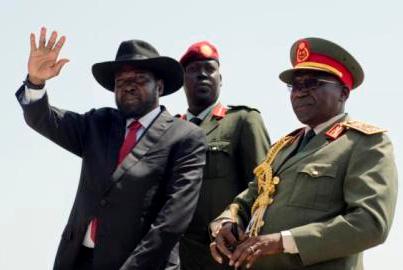South Sudanese army chief says no amount of weapons will achieve regime change in Juba
April 21, 2016 (JUBA) – General Paul Malong Awan, chief of general staff for the South Sudanese army (SPLA) has unexpectedly welcomed the return of the leader of the country’s armed opposition faction (SPLM-IO), Riek Machar, but warned that no amount of weapons would achieve regime change agenda in Juba.

The top army general who is a political ally to President Salva Kiir and was against the peace agreement, said he welcomed the rebel leader, Machar, back to Juba but added he was ready for any eventuality.
“If they [SPLM-IO] are sincere and really want to come for the implementation of peace, let them [come]. They are welcome. They are citizens of this country. If they are coming to fight, then what is the work of the army?,” he asked.
“Our work is to defend the constitution, the territory and the country against any security threats, whether internal or foreign aggression,” he added.
General Awan was commenting on the stalemate over whether the SPLA-IO should be allowed to come to Juba with its weapons, which the government alleged to include anti-tanks and laser-guided missiles.
“So let people not be worry about what they are coming with,” General Awan said at a briefing of group of soldiers and military officers on Wednesday at the general headquarters of the army in Juba.
On Thursday, the government continued to reject transportation to Juba of the opposition’s PKMs and RPGs weapons.
The Joint Monitoring and Evaluation Commission (JMEC), a body which oversees the implementation of the peace agreement between the rival parties, proposed that the agreed 195 troops of the SPLA-IO which accompany the first vice-president should be allowed to transport to Juba 20 PKMs and 20 RPGs from Gambella in Ethiopia.
The government continued to refuse the JMEC proposal, counter-proposing only 7 PKMs and 7 RPGs.
The top military officer of the South Sudanese army however downplayed fears that the armed opposition forces were being moved into the town with the intention to implement the regime change agenda from within the national capital.
The government previously accused the opposition leader of planning a military coup which they could not manage to control at the start of the conflict had Ugandan air defence force and ground troops not intervened at the time.
“I want to tell you this military secret. It is not the guns which fight. It is you if you believe in the cause of the war. There is no amount of weapons which will change the government. There are other ways to change the government,” said Awan.
His comments before the soldiers showed the degree of unexpected shift in his stance against the return of the first vice-president designate.
Analysts are keen to say it is an indication he may have been assured of big force in Juba to face the opposition or either retention of his position or possibility of getting other influential position in the forthcoming government.
It is also unclear whether he has changed his position with regards to the assembling points or cantonment sites for armed opposition forces in Greater Bahr el Ghazal and Equatoria regions.
The government asserts there are no rebels in the two regions because there were no active combat operations at the height of the conflict, as it was observed in the states of greater Upper Nile region where strategic towns and areas had changed hands several times during the war.
(ST)
